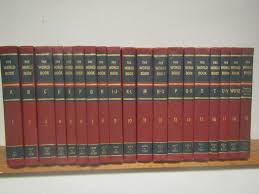
These days any question can be answered by a quick look online at Google. My grandson even poses questions to Siri on the IPad, not wanting to be bothered by typing in the question. But when I was in school the only source for information was the “World Book.” This multi-volume encyclopedia sat in every classroom and in the homes of my friends who had more money than we did. Eventually, when all four of us were in the same elementary school, my grandparents bought a set for our home. We were absolutely thrilled to be able to do our homework at home rather than at school.
When we had to do reports, whether on countries, states, flags or crops, we consulted the “World Book.” In fifth grade I had to research diseases, though I have no idea why. I brought the bar chart to my teacher hoping for an explanation of the very prevalent “venereal diseases” illustrated in the graph. She very calmly told me that venereal diseases were ones that people gave to one another. I remember going back to my seat mystified by her answer since I figured most diseases were ones people gave to one another. The “World Book” had no entry explaining venereal diseases, so I remained clueless.
By the time I got to high school the “World Book” had been replaced by the “Encyclopedia Britannica,” the Google of its day. Their articles were more in depth and written by experts in their fields, at least according to the preface. There were many fewer pictures, however, and they were less fun to sit and read. I knew no one who owned a set at home. Many years later I actually had an encyclopedia salesman come to our door. I had always thought the job was apocryphal, but apparently not.
The last encounter I had with encyclopedias came at the grocery store. You could buy a volume each week until you had a full set. They were called “Funk and Wagnalls” and I passed. Something about that name didn’t evoke confidence!

I never had the EB, but always coveted it. I started with a copy of ‘The Children’s Encyclopedia’, and moved on later to a similar ‘World Encyclopedia’. Together with my ‘Children;s Illustrated Bible’, and various books of maps, they were where I learned almost everything, until the age of 11. 🙂
Best wishes, Pete.
LikeLike
I knew you must have loved maps early. Me too. I even had a puzzle which was a map of the U.S.
LikeLiked by 1 person
This is so true. I google a lot for answers especially when I had my little girl. That Siri though😄 Your grandson is clever.
LikeLike
I first heard of Funk and Wagnalls from the sixties show, Rowan and Martin’s Laugh In. Apparently the name was so peculiar it warranted a laugh with this line, “go look that up in your Funk and Wagnalls.” The other encyclopedias I knew of and used.
LikeLike
I forgot about that reference. Maybe that is what made me skeptical about buying them at Safeway.
LikeLiked by 1 person
I remember when I left work in the public library to have my first son, I wondered how I would manage without the encyclopaedias on tap, and Black’s Medical Dictionary, and the London Road Atlas… and many more useful tomes.
The internet is a wonderful thing – I never use my Roget’s Thesaurus or rhyming dictionary any more; it’s easier to Google the word in question and ‘synonym’ or ‘rhyme’ and I have a selection to choose from.
My only caveat is that we knew, by the time a book was published, that it was authoritative. The same can’t be said for Google reuslts.
LikeLike
That is the biggest drawback doing research online. In genealogy errors are repeated over and again, for instance. And don’t get me started on the conspiracy theories about jet trails in the sky.
LikeLike
I own a complete set of 1983 World Book Encyclopedias from when my wife was a sales rep for them for a year or two. I still look things up in them occasionally and have no intention of getting rid of them.
LikeLike
I love that your wife sold them. They were very well edited and reliable, unlike Wikipedia.
LikeLike
Those were the days when we relied on those tomes for answers.
LikeLike
I also had to go to the library to do research, Elizabeth. Google is fabulous but you have to be careful about the source of the information as it is not all reliable. I always check to as many sources as possible on a topic when I do research.
LikeLike
Absolutely. That is something I keep emphasizing to my grandchildren. Many people seem to believe the first thing they read.
LikeLike